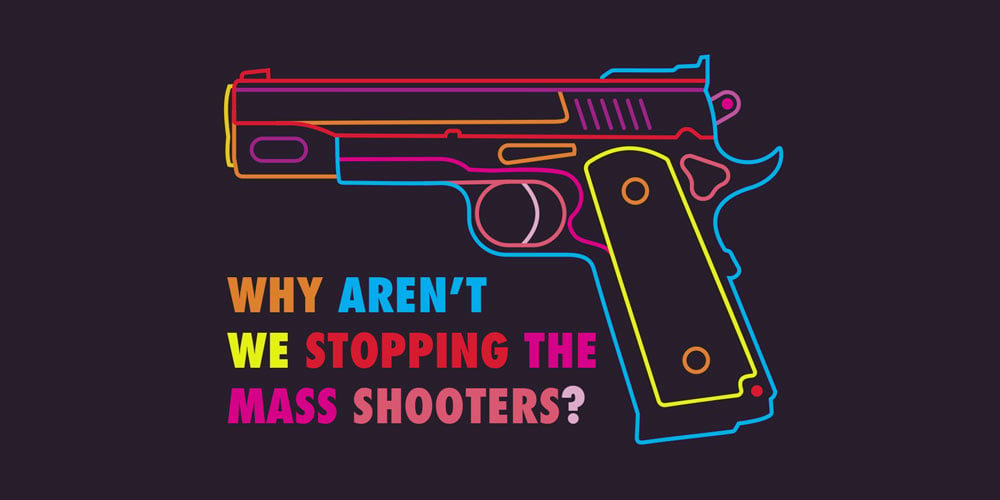
Mass shootings occur at an alarming regularity these days with gunmen opening fire at any number of venues. There is no way to predict when and where these incidents will happen, but (in many cases) the perpetrators have displayed a history of mental health issues, anger management problems and social challenges. Oftentimes, people who are familiar with these individuals describe them after the fact as “ticking time bombs” or “off” in some way, but felt that their hands were tied when it came to doing something proactive about it. While these are generally extremely sensitive situations that require professional intervention and long-term treatment, there must be options available to someone who suspects a problem is brewing. Those who do make the effort can be discouraged after learning that legally, there is very little that can be accomplished before the person actually snaps.
Understandably, avoidance tactics are often the fallback position, and this allows a potential shooter to ramp up disturbing behaviors and actions with little or no hindrance from law enforcement or health care experts. Each time a shooter opens fire on innocent citizens, the nation goes through the now predictable cycle of mourning collectively, vowing to do better at preventing them in the future, and ultimately normalizing until the next incident occurs. With each event, outrage increases, but despite the fact that we have all been affected by these tragedies, it seems that very little is being done to stop them. Why is this? The answers are as varied as the reasons the shooters carry out their heinous acts, but one of the most infuriating reasons has to do with the laws that are currently in place.
* * * * *
In 1967, then Governor Ronald Reagan signed the Lanterman-Petris-Short Act, which ended the practice of inappropriate and indefinite institutionalization of people with mental illnesses and developmental disabilities. It also put legal protections limiting involuntary holds into place in an effort to balance personal liberties with the need for care. It effectively ended most state hospital commitments by the judiciary system. While this approach might have made sense at the time, the mental health care system has changed significantly over the last fifty years. These changes have impacted patients’ ability to access prompt evaluation and treatment.
* * * * *
During his confession interview, the Parkland, Florida shooter referred to voices and demons in his head that commanded him to burn, kill and destroy. He reported having experienced this phenomenon since he was a child and had heard them as recently as the morning of the massacre. He also admitted to a history killing birds and animals, and described being confused about why he had scared women he had dated in the past. He had been suspended from school, described as a “troubled student” and had amassed a long list of disciplinary problems and mental health issues. At least three people contacted law enforcement to voice concern that he might carry out a school shooting and he, himself, caused great alarm when he announced, “I’m going to be a professional school shooter” on a YouTube channel. Mere weeks before murdering seventeen students and staff members at Marjory Stoneman-Douglas High School, the FBI was alerted about his potential to be a school shooter. Unfortunately, the agency failed to follow up on the tip.
This individual was known to be disturbed from the time he was a child, and had received numerous psychiatric and clinical services over the years. Despite all of the red flags, professional interventions and warnings about him, he fell through the cracks and completed his deadly mission.
What could have been done to stop him? The answer to this question is very complex and forces us to examine the philosophical, legal and ethical implications of treating someone against his will. The question of infringing on civil liberties is the battle cry of those who seek to protect personal freedoms, but should these concerns hold more weight than the safety of the general population? Just because someone doesn’t want (or doesn’t believe he needs) psychiatric treatment doesn’t necessarily mean that he shouldn’t receive it. In fact, when people are treated and improve, they often become angry that they were left to languish in their illness for so long.
In fact, until his mother died, the Parkland shooter had been receiving treatment and it was working. Unfortunately, after she passed, he was of age and could no longer be legally compelled to receive treatment.
* * * * *
Many medical and legal experts are advocating for an expansion of the definition of the term gravely disabled. They support the idea that conservatorship should be broadened in order to ensure that people get the assistance they need. To that end, the California State Legislature recently considered several bills related to this matter. One has ultimately passed and made its way to the governor’s office. Senate Bill 1045, makes it easier to conserve people with serious mental illnesses and drug abuse disorders, who refuse treatment and have been frequently detained by police. Portions of another bill, Assembly Bill 2156, introduced by Assembly Member Phillip Chen, have also been folded into this legislation. While not perfect, it suggests changes that will move us in the right direction.
Where do you stand on expansion of conservatorship? Should the rights of the few who fall into the category of potential shooters be protected over the rights of innocent citizens? Please leave your comments below.
Some of the links on this website are affiliate links, and as an Amazon Associate, we may earn an affiliate commission from qualifying purchases – at no cost to you.
This website is for informational and/or entertainment purposes only and is not a substitute for medical advice, diagnosis, or treatment.
© 2025 Drew Pinsky Inc. | All Rights Reserved
Get alerts from Dr. Drew about important guests, upcoming events, and when to call in to the show.
For text alerts, msg and data rates may apply